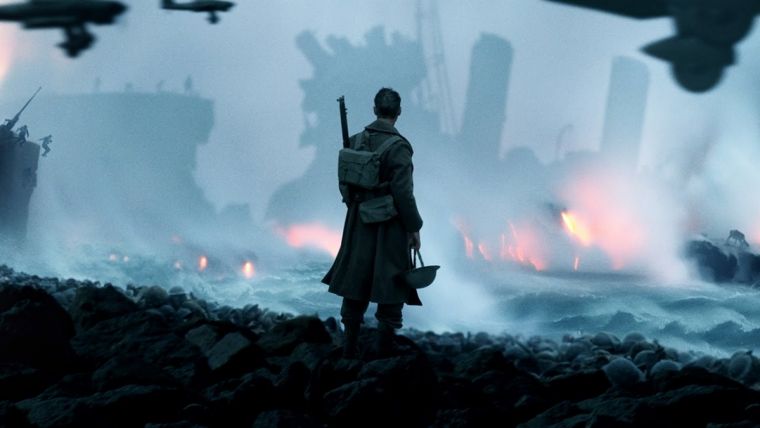Dunkirk review: a magnificent light in our darkest hour

The evacuation of the British Army at Dunkirk is part of a period in World War Two history that Winston Churchill called 'the darkest hour'. France had fallen, the US army were still far away, and the British Empire stood alone and in retreat against the rising forces of Nazi Germany and its allies. It's hard to imagine a more bleak or desperate prospect than an army of 400,000 men trapped on a beach, as brutal enemies closed in. And thanks to Christopher Nolan, we no longer need to imagine.
Nolan's Dunkirk absolutely translates the oppressive, relentless horror of that 'darkest hour' to the big screen. Plunged into the heart of the action from three overlapping vantage points, we follow the lives of the men who fought, fought for life, and fought for others in the famous evacuation. In three different narratives, and across three different timescales, we follow Tommy (Fionn Whitehead), an army private struggling to get off the beach, Farrier (Tom Hardy), an RAF pilot trying to desperately provide air support to fend off murderous German pilots, and Mr Dawson (Mark Rylance), a civilian sailor who answers the call alongside hundreds of others to come to the army's rescue.
What follows is as brutal as history demands it to be. The Germans, intent on wiping out the whole British army as it retreats, constantly shoot, bomb and torpedo their terrified foes, and as such the tension barely relents for a single moment of the film's 106-minute running time. As escape and rescue attempts flounder one after another, all hope appears to be extinguished. Tommy's efforts are frustrated, Farrier and Dawson's seem all in vain. Despite what we might know as fact, Nolan manages to totally convince us that the darkest hour offers no escape.
And yet, as the history books remind us, hope was not defeated on that French beach. Instead, what's become known as 'the miracle of Dunkirk' took place, as by sheer force of will and collective courage, Britain returned close to 340,000 soldiers home to England – men who would go on to play a part in the eventual reversal of the war. Dunkirk is as true to this part of history as it is to the first half of the story, and Nolan delivers glorious redemption at the hands of ordinary people. But boy, is there a lot of darkness before we get to the light...
It's no overstatement to call Dunkirk a masterpiece. Nolan is a story teller and film-maker of mercurial rarity, and despite making an ambitious story much more complicated by it's triple-layered viewpoint, he manages to produce a war film that is absolutely like no other. It is fantastically immersive; it is masterfully told; it insists that you care about a whole cast of characters, even if you've only met them for a moment. A grand story of nations is told through just a few seemingly insignificant players, and the result is a film which takes hold of your being and forces you to see history afresh.
The cast are uniformly excellent, from the heroic pier-master Commander Bolton (Kenneth Branagh), who will not leave France until every man is safely off the beach, to Harry Styles as Private Alex, cast when Nolan was allegedly unaware of his pop stardom. Hardy gives his best performance in a mask since The Dark Knight Rises, but the real star is Rylance – astonishingly sympathetic as the humble old mariner who never thinks of his own safety before setting sail for war. Let's hope the Academy members' memories are able to reach back this far come awards season - Rylance absolutely deserves recognition.
If Rylance's character is the heart of the film, it is because the extraordinary redemption story of Dunkirk is all due to humble, ordinary people who decided to play their part. These men – and boys – left behind because they were deemed the wrong age to fight, were absolutely average. All that set them apart was their willingness to see light defeat darkness, even if it meant laying down their own lives. For once, the clearly-resonant Christian themes hardly need pointing out.
Shot deliberately for IMAX screens in 65mm format, Dunkirk looks, sounds and feels like no other movie. If you want to see what a real-life miracle looks like, see it, and on the biggest screen available. Like the light-over-dark triumph that it depicts, Nolan's film truly is extraordinary.
Martin Saunders is a Contributing Editor for Christian Today and the Deputy CEO of Youthscape. Follow him on Twitter @martinsaunders.











